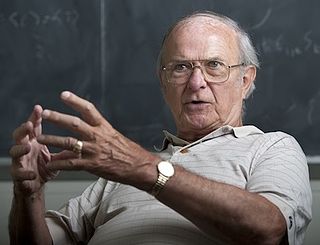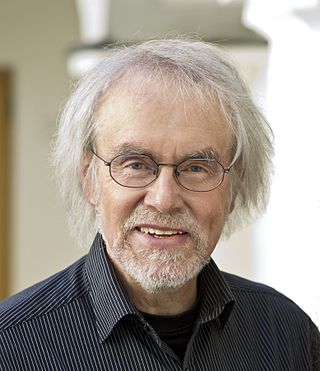Related Research Articles

James Watson Cronin was an American particle physicist.

VictorFrederick "Viki" Weisskopf was an Austrian-born American theoretical physicist. He did postdoctoral work with Werner Heisenberg, Erwin Schrödinger, Wolfgang Pauli, and Niels Bohr. During World War II he was Deputy Division Leader of the Theoretical Division of the Manhattan Project at Los Alamos, and he later campaigned against the proliferation of nuclear weapons.

Dieter Lüst is a German physicist, full professor for mathematical physics at the Ludwig Maximilian University of Munich since 2004 and a director of the Max Planck Institute for Physics in Munich. His research focusses on string theory. In 2000, he received the Gottfried Wilhelm Leibniz Prize of the Deutsche Forschungsgemeinschaft, which is the highest honour awarded in German research.
Roberto Daniele Peccei was a theoretical particle physicist whose principal interests lay in the area of electroweak interactions and in the interface between particle physics and physical cosmology. He was most known for formulating the Peccei–Quinn theory, which attempts to resolve the strong CP problem in particle physics.

Jonathan Richard "John" Ellis is a British-Swiss theoretical physicist.

Georgi (Gia) Dvali is a Georgian theoretical physicist. He is a professor of theoretical physics at the Ludwig Maximilian University of Munich, a director at the Max Planck Institute for Physics in Munich, and holds a Silver Professorship Chair at the New York University. His research interests include String theory, Extra dimensions, Quantum gravity, and the Early universe.

Léon Charles Prudent Van Hove was a Belgian physicist and a Director General of CERN. He developed a scientific career spanning mathematics, solid state physics, elementary particle and nuclear physics to cosmology.

François, Baron Englert is a Belgian theoretical physicist and 2013 Nobel Prize laureate.

Carl Richard Hagen is a professor of particle physics at the University of Rochester. He is most noted for his contributions to the Standard Model and Symmetry breaking as well as the 1964 co-discovery of the Higgs mechanism and Higgs boson with Gerald Guralnik and Tom Kibble (GHK). As part of Physical Review Letters 50th anniversary celebration, the journal recognized this discovery as one of the milestone papers in PRL history. While widely considered to have authored the most complete of the early papers on the Higgs theory, GHK were controversially not included in the 2013 Nobel Prize in Physics.

Luciano Maiani is a Sammarinese physicist best known for his prediction of the charm quark with Sheldon Glashow and John Iliopoulos.
Wolfgang Gentner was a German experimental nuclear physicist.
Reinhard Oehme was a German-American physicist known for the discovery of C non-conservation in the presence of P (parity) violation, the formulation and proof of hadron dispersion relations, the "Edge of the Wedge Theorem" in the function theory of several complex variables, the Goldberger-Miyazawa-Oehme sum rule, reduction of quantum field theories, Oehme-Zimmermann superconvergence relations for gauge field correlation functions, and many other contributions.

Anthony Ichiro Sanda is a Japanese-American particle physicist. Along with Ikaros Bigi, he was awarded the 2004 Sakurai Prize for his work on CP violation and B meson decays.
Manfred Lindner is a German physicist and director at the Max Planck Institute for Nuclear Physics in Heidelberg, Germany. He conducts basic research in particle and astro-particle physics.
Susumu Okubo was a Japanese theoretical physicist at the University of Rochester. Ōkubo worked primarily on elementary particle physics. He is famous for the Gell-Mann–Okubo mass formula for mesons and baryons in the quark model; this formula correctly predicts the relations of masses of the members of SU(3) multiplets in terms of hypercharge and isotopic spin. Ōkubo died in July 2015.

Riccardo Barbieri is an Italian theoretical physicist and a professor at the Scuola Normale Superiore di Pisa. He has written more than two hundred research papers in the field of theoretical elementary particle physics, and has been particularly influential in physics beyond the Standard Model.
Cecilia Jarlskog is a Swedish theoretical physicist, working mainly on elementary particle physics.
Sigfried Bethke is a German physicist and science manager.

Andrzej Jerzy Buras is a Polish-born Danish theoretical physicist, professor emeritus at the Technical University Munich (TUM).
Jennifer Anne Thomas,, is a British experimental particle physicist and professor at University College London. She has been a pioneer in the development of particle detectors, and the recipient of the Michael Faraday medal and prize in 2018 for her "outstanding investigations into the physics of neutrino oscillations".
References
- ↑ Krewald, Siegfried; Machner, Hartmut (March 2008). "Symmetries and hadron dynamics go on the MENU". CERN Courier. 48 (2): 30–31.
- ↑ Harrison, Paul (October 2014). "CP violation: past, present and future". CERN Courier.
- ↑ APS Physics, 2004 J. J. Sakurai Prize for Theoretical Particle Physics Recipient